We are on our Way!
Tunisia - Libya - Egypt
Tunisia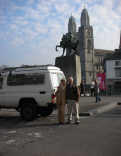
On Feb. 25th we left Zurich after a hectic and strenuous
preparation phase of several weeks. We rushed to Genova, where we took
the ferry to Tunis, for a 24 hour crossing. As it turned out, Victoria
was back from Argentina where she visited her family so she was able to
join Reto through Tunisia and Libya. The original plan was that she
flies to Cairo. We still had small items to do in the car and lots of
food and material to fit in our closets. So our trip in Tunisia (where
we had already been with our old Land-Rover) also consisted in
organizing our stuff.
It was Reto's wish to drive first to the most northern
point of Africa (Swiss and their obsession with measuring... ). After a
three hour customs procedure to enter Tunisia, which was unexpected to
us, we drove to
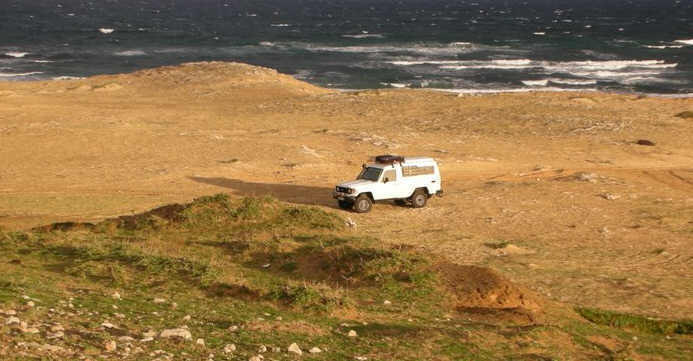 Cap
Engela (at N 37 20'.673 E 009 44'.353) and
slept on a windy beach, close to the lighthouse. The following morning
we discovered that we had camped on a military practice ground, as there
were bombs scattered around and remains of blown-up trucks.
Cap
Engela (at N 37 20'.673 E 009 44'.353) and
slept on a windy beach, close to the lighthouse. The following morning
we discovered that we had camped on a military practice ground, as there
were bombs scattered around and remains of blown-up trucks.
We traversed the 500km in Tunisia within 4 days, which were rather windy, wet and cold. It was a good opportunity to get to know our new car, including the heater.
Libya
We entered Libya on March 1st. To our surprise it was again
more
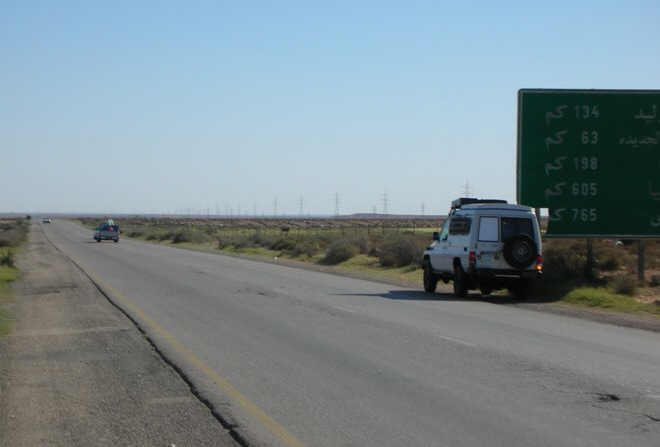 complicated to exit Tunisia, where we had to wait more than one
hour for the official who had the stamp for exporting the car. Despite
having long procedures because every car driving in Libya must carry
Libyan license plates, entering the country was pretty easy, and this
even in our situation. We had just a transit visa, which does not seem
to be commonly issued. Everyone we know got a tourist visa and to obtain
this it is necessary to book with a local travel agency and it is
compulsory to take a guide along. Later we confirmed that our transit
visa was unusual as during the control checks on the road we were asked
for the guide and the list of members of our group. As we said "no
group, we are alone", they looked into our
complicated to exit Tunisia, where we had to wait more than one
hour for the official who had the stamp for exporting the car. Despite
having long procedures because every car driving in Libya must carry
Libyan license plates, entering the country was pretty easy, and this
even in our situation. We had just a transit visa, which does not seem
to be commonly issued. Everyone we know got a tourist visa and to obtain
this it is necessary to book with a local travel agency and it is
compulsory to take a guide along. Later we confirmed that our transit
visa was unusual as during the control checks on the road we were asked
for the guide and the list of members of our group. As we said "no
group, we are alone", they looked into our
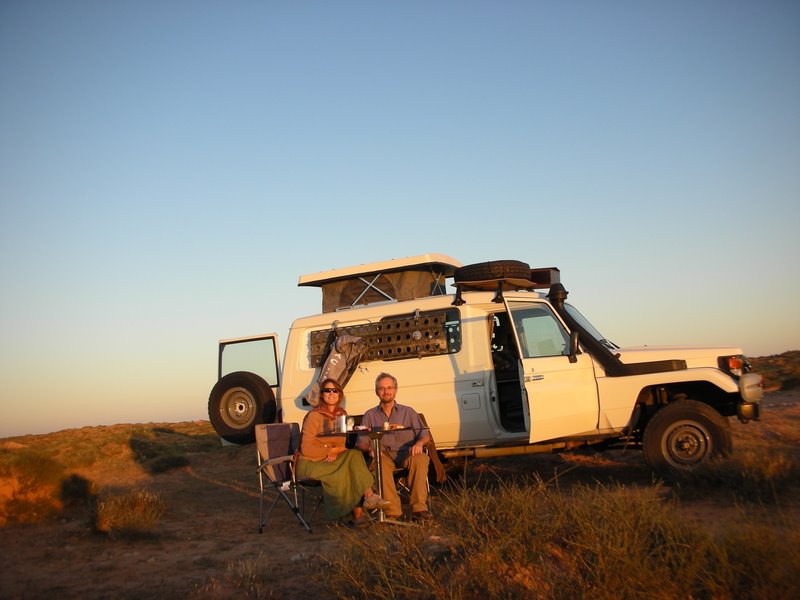 passports and visas and
everything was fine. So there we were at the border without a guide
waiting for us and having to go through immigration, customs clearance
for the car, insurance, police, etc. Luckily some officers, who spoke a
bit of English, were very helpful and directed us to the right
buildings. The whole procedure took us about one and a half hours.
passports and visas and
everything was fine. So there we were at the border without a guide
waiting for us and having to go through immigration, customs clearance
for the car, insurance, police, etc. Luckily some officers, who spoke a
bit of English, were very helpful and directed us to the right
buildings. The whole procedure took us about one and a half hours.
It was almost night when we drove away and we needed
fuel desperately... We were not the only ones. As the fuel costs in
Libya about a third of the price in Tunisia, we saw already many cars
being pushed across the border... The first gas station we found was 15
km inland and there were lines of about 200 meters of cars waiting to
load. We had no choice but to wait in line. There we got our first
impression on the Libyan people. After five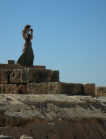 minutes, a guy knocks on our
window and asks if we were tourists and needed diesel. To our
affirmative reply he started saying "Tourists no stand by, these cars go
Tunisia, you have diesel now" and he took us out of the line and
directed us to the pump. We thanked him and he disappeared very quickly.
Out of shame for having skipped the line we only filled our smaller
tank.
minutes, a guy knocks on our
window and asks if we were tourists and needed diesel. To our
affirmative reply he started saying "Tourists no stand by, these cars go
Tunisia, you have diesel now" and he took us out of the line and
directed us to the pump. We thanked him and he disappeared very quickly.
Out of shame for having skipped the line we only filled our smaller
tank.
Unfortunately we traveled the more than 2'000 km through
the country in only five days (our transit visa was valid one week), and
we could not see the marvelous desert. At the first impression, it is a
huge country scarcely populated. There are less than 6mio inhabitants on
a surface the size of a large part of Europe. We did manage to visit two
old Roman cities, which are very well preserved. First Sabrata and then
Leptis Magna
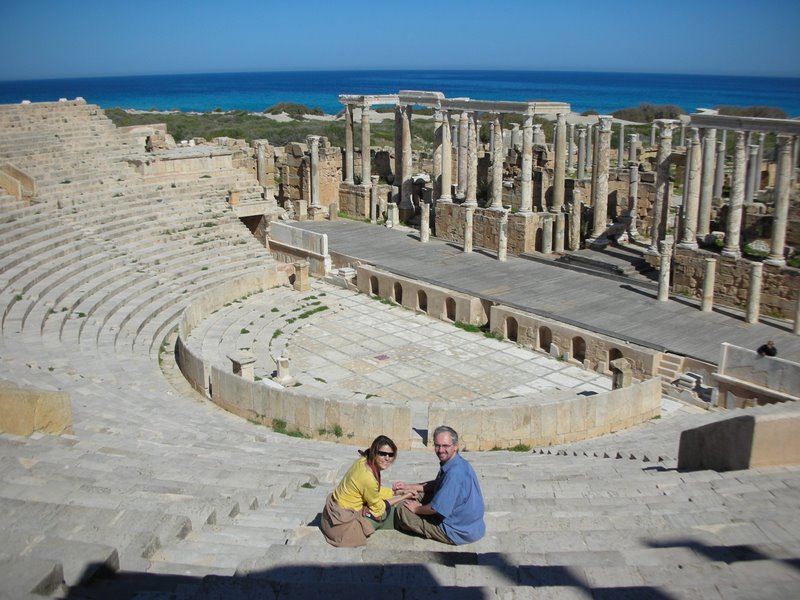 impressed us both. They are, together with Palmyra in Siria,
the best preserved Roman cities we have seen, far better that what
remains in Rome today. Leptis Magna was covered by sand and mud during
centuries, so lots or its buildings are in quite good shape. The city
was huge, it was built in the 6th century B.C. and during its peak
time, with the reign of Septimus (during the 2nd century A.D.) it had
about 100.000 inhabitants.
impressed us both. They are, together with Palmyra in Siria,
the best preserved Roman cities we have seen, far better that what
remains in Rome today. Leptis Magna was covered by sand and mud during
centuries, so lots or its buildings are in quite good shape. The city
was huge, it was built in the 6th century B.C. and during its peak
time, with the reign of Septimus (during the 2nd century A.D.) it had
about 100.000 inhabitants.
The Libyans continued being very hospitable hosts until
we left. Many did not speak English but made a big effort to understand
us and made themselves understood, speaking Arabic and gesticulating a
lot. This was mainly when asking for directions. If we asked someone in
a car, very often they diverted their routes in order show us the
direction. It seamed to us
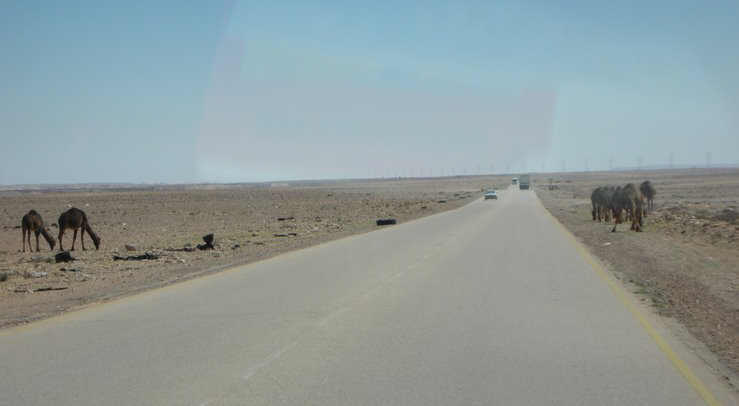 that they were not used to seeing tourists
and they were very happy to meet some. The people that spoke better
English (or French) were those in Internet Cafes and foreigners. Libya
appears to be full of foreigners from other African nations.
that they were not used to seeing tourists
and they were very happy to meet some. The people that spoke better
English (or French) were those in Internet Cafes and foreigners. Libya
appears to be full of foreigners from other African nations.
Egypt
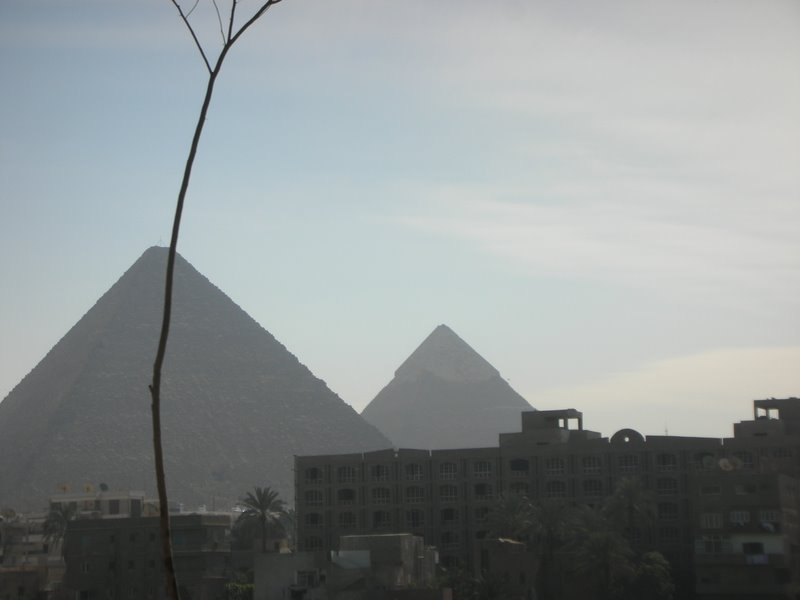 Our exit from Libya was quite easy, although it was very
useful to have some info we printed from the internet (www.trailblazer.com),
as signs are all in Arabic and one has to know how the procedure goes
(what comes first, etc.). Then came Egypt and procedures got exhaustive.
Although by far more used to tourism, this country seems to have too
many army and police officers who need to be kept busy... It is, and
specially when entering with a vehicle, extremely bourocratic. It is
something like going to office A, get one stamp, go to B, pay USD 0.50
previously changed at the bank into Egyptian Pounds, go back to A, show
the receipt, go to C, get a paper, go to A, who asks you to make a
photocopy, (machine located next to B, which is 400m from A, but
attendant now having lunch and his assistant cannot photocopy), drive
car to D, walk back to A, etc., etc. As also Lybians have to go through
the same procedure, we are sure we did not do it more complicated than
necessary. It took us some 3 hours. During the process we discovered a
problem: Although Egypt offers the facility to obtain the visa at the
border, this is valid only for one month. We did not know this as
visas obtained abroad are valid for a three month stay. The one month
visa turned out to be quite bad as it determines the time that the car
is allowed to stay in the country (despite having the Carnet the
Passages en Douane, which is like the car's own passport allowing
temporary importation to member states during 6 months). It is possible
to change this at another immigration point, but it takes an
Our exit from Libya was quite easy, although it was very
useful to have some info we printed from the internet (www.trailblazer.com),
as signs are all in Arabic and one has to know how the procedure goes
(what comes first, etc.). Then came Egypt and procedures got exhaustive.
Although by far more used to tourism, this country seems to have too
many army and police officers who need to be kept busy... It is, and
specially when entering with a vehicle, extremely bourocratic. It is
something like going to office A, get one stamp, go to B, pay USD 0.50
previously changed at the bank into Egyptian Pounds, go back to A, show
the receipt, go to C, get a paper, go to A, who asks you to make a
photocopy, (machine located next to B, which is 400m from A, but
attendant now having lunch and his assistant cannot photocopy), drive
car to D, walk back to A, etc., etc. As also Lybians have to go through
the same procedure, we are sure we did not do it more complicated than
necessary. It took us some 3 hours. During the process we discovered a
problem: Although Egypt offers the facility to obtain the visa at the
border, this is valid only for one month. We did not know this as
visas obtained abroad are valid for a three month stay. The one month
visa turned out to be quite bad as it determines the time that the car
is allowed to stay in the country (despite having the Carnet the
Passages en Douane, which is like the car's own passport allowing
temporary importation to member states during 6 months). It is possible
to change this at another immigration point, but it takes an
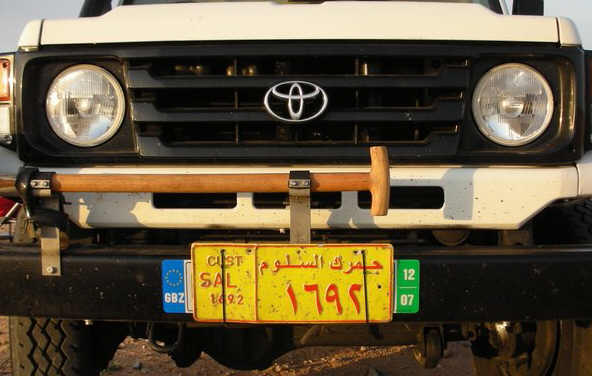 incredible
amount of time. First, because the Egyptians also demand that every car
driving in Egypt carries Egyptian license plates. Then they also issue a
car license (the form of a credit card, in Arabic) and then the customs
stamps in the Carnet. It is also compulsory to buy an insurance. All
these documents have an expiry date, which we now have to extend, of
course at all different offices, which can take more than one day each
to process the extension. In fact, it's worse than that... while writing
these lines, Reto is at the port, here in Alexandria, already since five
hours, trying to solve the issue at the customs.
incredible
amount of time. First, because the Egyptians also demand that every car
driving in Egypt carries Egyptian license plates. Then they also issue a
car license (the form of a credit card, in Arabic) and then the customs
stamps in the Carnet. It is also compulsory to buy an insurance. All
these documents have an expiry date, which we now have to extend, of
course at all different offices, which can take more than one day each
to process the extension. In fact, it's worse than that... while writing
these lines, Reto is at the port, here in Alexandria, already since five
hours, trying to solve the issue at the customs.
The whole process started before yesterday in Cairo, where we could extend our visas. We did not go there alone. Hassan, from a travel agency we are dealing with for a desert trip, was offered to us in order to find places and help us with the language. That went quite fine. We had to fill forms, make copies of our passports, which turned out to be unreadable but were accepted (?), and pay a small fee. Then we had to leave the passports a couple of hours there and pick them up later. Yesterday, already in Alexandria, we tried to access the port to go to the customs, but we found out that we needed an authorization to do this. The "authorization" building was of course somewhere else and once there, they demanded several copies (passport, traffic license, visa, Carnet de Passages, etc.) and told us to come back in two hours to process the papers in a computer... with the result that it was then too late to go to the customs. This seems to be "normal" for Egyptians... We were again lucky to have someone local along, who assisted us mainly as an interpreter. It would have been impossible to find the places in time (offices are open from 9 to 12) without the help of locals. If it was possible to do all this through agencies, we would have of course done it, but traveling with the own car is quite unusual so they want the owner to do this personally.
As mentioned before, it took quite a while to enter the
country. Also because having realized the one month visa issue, we tried
to obtain one valid longer right away at the border. By that time Reto
was so tired of
 dealing with them that he sent me. I went back to the
officer that stamped my passport, then got to a superior, then another
higher officer came (I recognized their ranks through their uniforms,
the amount of bars on their shoulders). He took me to the office of the
highest person in the whole immigration (this one had even stars...),
who then called his boss. It turns out to be that a one month visa is
valid for 44 days... without an extension needed (this would have been
enough as we planned to stay six weeks). But it does not apply for the
car... When I told them that it was the car where we had the problem,
they say this has to be solved with Traffic Police, who at their turn
had already expressed that the regulation is to issue validities
according to the visas. Frustrated with this vicious circle, I
asked the high-rank officer to speak with the traffic police, half a
kilometer away, which he did. A long discussion of about one more hour
followed. The result was nothing, a total loss of time and energy.
The guy stamping the Carnet refused to put an expiry date in 44 days,
despite the high-rank officer stating that our visas were valid that
long...
dealing with them that he sent me. I went back to the
officer that stamped my passport, then got to a superior, then another
higher officer came (I recognized their ranks through their uniforms,
the amount of bars on their shoulders). He took me to the office of the
highest person in the whole immigration (this one had even stars...),
who then called his boss. It turns out to be that a one month visa is
valid for 44 days... without an extension needed (this would have been
enough as we planned to stay six weeks). But it does not apply for the
car... When I told them that it was the car where we had the problem,
they say this has to be solved with Traffic Police, who at their turn
had already expressed that the regulation is to issue validities
according to the visas. Frustrated with this vicious circle, I
asked the high-rank officer to speak with the traffic police, half a
kilometer away, which he did. A long discussion of about one more hour
followed. The result was nothing, a total loss of time and energy.
The guy stamping the Carnet refused to put an expiry date in 44 days,
despite the high-rank officer stating that our visas were valid that
long...
We tried to forget all this, after all we had been
warned by other travelers, and decided to drive towards Siwa, an oasis
not too far from the Libyan border. After spending one night in the
desert, we reached the
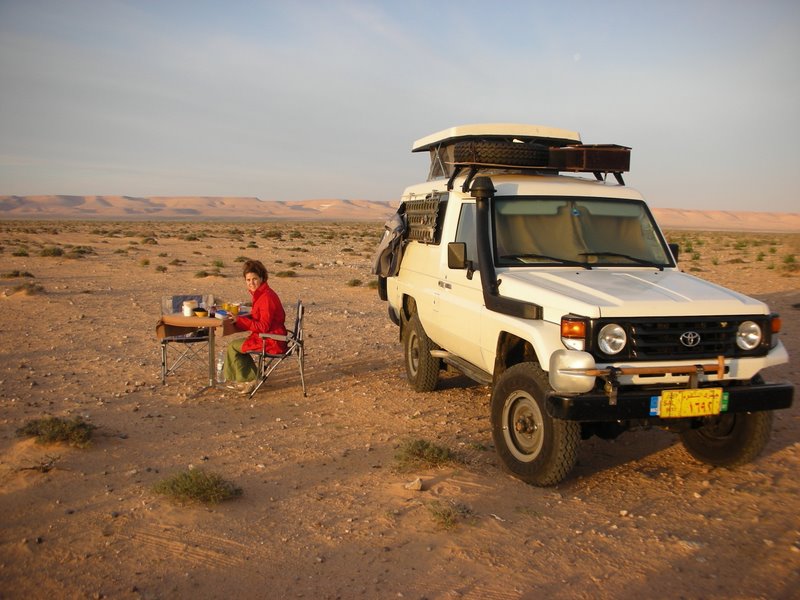 town of Sidi Barrani, from where a track to Siwa
is indicated in our map. We followed a small asphalt road. We saw a town
in the distance and when the tarmac finished we followed tracks towards
it and then drove through it... By then, we had realized it was a
military base and we got the feeling we should not be there, despite
many soldiers greeting us... We ended up in an access road with a gate
at the end where we were stopped. A long process of about four hours
followed, a soda drink and two teas included. The soldiers conducted us
to an office, where we had to wait for a higher officer that asked for
our passports and how we got there, why, etc. then asked us to drive him
the same way we came into the base, then asked if we had a camera and
looked at our pictures. He was very friendly but had to report the issue
to the intelligence police. We were then escorted to town, met an
intelligence officer who looked at our pictures, then waited for a
higher intelligence officer for another hour or so, who in fairly good
English and wearing the most modern and western casual clothes we had
seen in Egypt asked the whole thing again, wrote it down in his diary
book, photocopied our passports and made a picture of us with his own
digital camera... He was also friendly. He told us we had committed a
crime by leaving the main road and entered a military zone and therefore
we had been sort of arrested. We replied we were sorry, we did not know,
it was not written anywhere, where we entered not even in Arabic...
He continued saying that they analyzed the case and we could leave now,
but we were not allowed to leave the main road (he was emphatic about
this)!
town of Sidi Barrani, from where a track to Siwa
is indicated in our map. We followed a small asphalt road. We saw a town
in the distance and when the tarmac finished we followed tracks towards
it and then drove through it... By then, we had realized it was a
military base and we got the feeling we should not be there, despite
many soldiers greeting us... We ended up in an access road with a gate
at the end where we were stopped. A long process of about four hours
followed, a soda drink and two teas included. The soldiers conducted us
to an office, where we had to wait for a higher officer that asked for
our passports and how we got there, why, etc. then asked us to drive him
the same way we came into the base, then asked if we had a camera and
looked at our pictures. He was very friendly but had to report the issue
to the intelligence police. We were then escorted to town, met an
intelligence officer who looked at our pictures, then waited for a
higher intelligence officer for another hour or so, who in fairly good
English and wearing the most modern and western casual clothes we had
seen in Egypt asked the whole thing again, wrote it down in his diary
book, photocopied our passports and made a picture of us with his own
digital camera... He was also friendly. He told us we had committed a
crime by leaving the main road and entered a military zone and therefore
we had been sort of arrested. We replied we were sorry, we did not know,
it was not written anywhere, where we entered not even in Arabic...
He continued saying that they analyzed the case and we could leave now,
but we were not allowed to leave the main road (he was emphatic about
this)!
The oasis Siwa turned out to be very nice. We arrived
the same day and being tired, went to a hotel, the
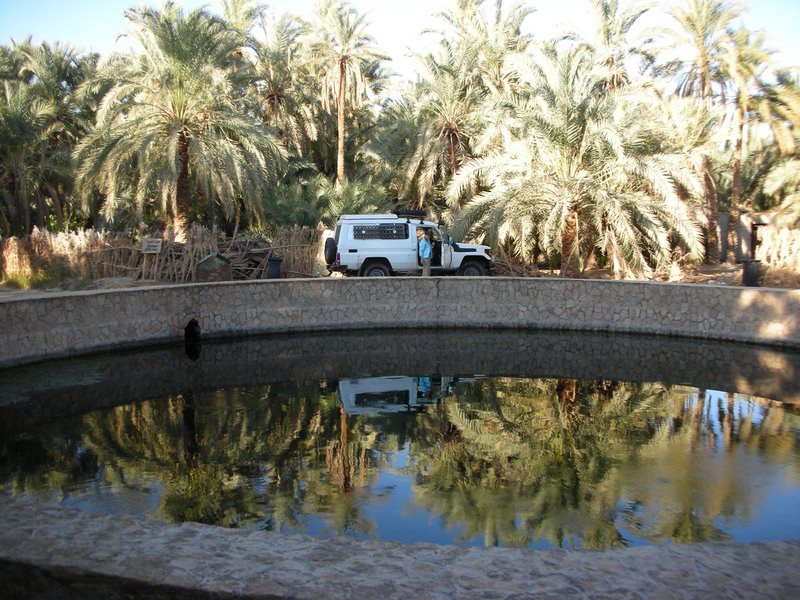 Shali Lodge, with
it's very original Siwan architecture. We found also the Siwis very
nice. They are helpful and did not hassle us. There is also no cheating.
Prices are straight forward, many times written. The society appears to
be conservative. Most women are fully covered, wearing a veil even on
their faces. This has nothing to do with friendliness towards
foreigners. Specially the kids wave to all foreigners, in one case even
a totally covered mother also waved to us. The guides and people working
for the tourism industry were very helpful in offering information and
support without expecting anything in return.
Shali Lodge, with
it's very original Siwan architecture. We found also the Siwis very
nice. They are helpful and did not hassle us. There is also no cheating.
Prices are straight forward, many times written. The society appears to
be conservative. Most women are fully covered, wearing a veil even on
their faces. This has nothing to do with friendliness towards
foreigners. Specially the kids wave to all foreigners, in one case even
a totally covered mother also waved to us. The guides and people working
for the tourism industry were very helpful in offering information and
support without expecting anything in return.
For Reto's pleasure we did our own excursion into the
sand dunes, which are really beautiful (previously
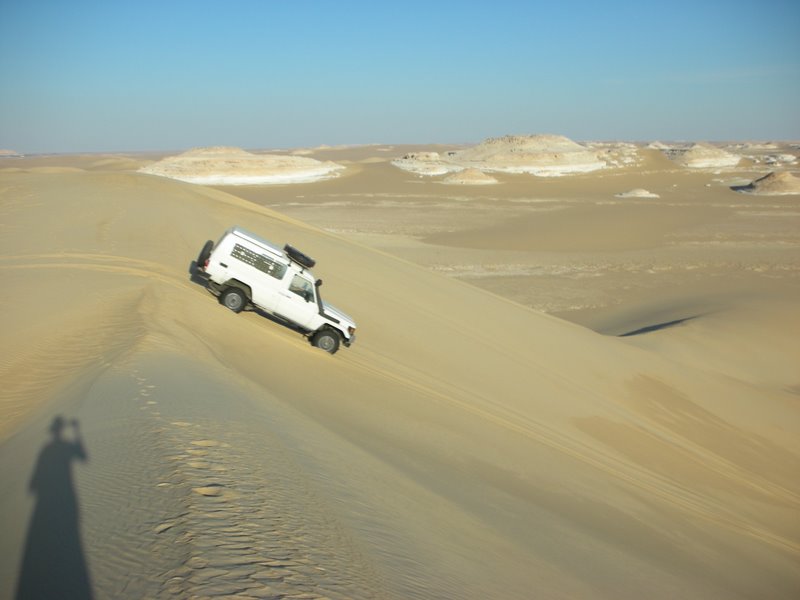 loosing a whole
morning as it is necessary to get a permit from the intelligence police
to go there as well as to our next destination, the oasis of Barharyia).
The 400 km of the Siwa - Barhayia road are a continuous scenic view,
with the road in very different conditions. From perfect new tarmac to
sand dune passages, only a few vehicles a day traverse this part of the
desert. That night we slept just out of town in a sandy area.
loosing a whole
morning as it is necessary to get a permit from the intelligence police
to go there as well as to our next destination, the oasis of Barharyia).
The 400 km of the Siwa - Barhayia road are a continuous scenic view,
with the road in very different conditions. From perfect new tarmac to
sand dune passages, only a few vehicles a day traverse this part of the
desert. That night we slept just out of town in a sandy area.
We then continued to Cairo. We stayed in Giza and closed
a deal with Siag Travel for our desert tour. This time it's going to be
the real thing. We are going to spend two weeks in the southwest of
Egypt. The trip starts in a week's time (on March 18th). We also managed
to see the light show at the Pyramids (we still did not visit them) and
extend our visas. We tried to get our visas for Sudan as well, but
opening hours operated
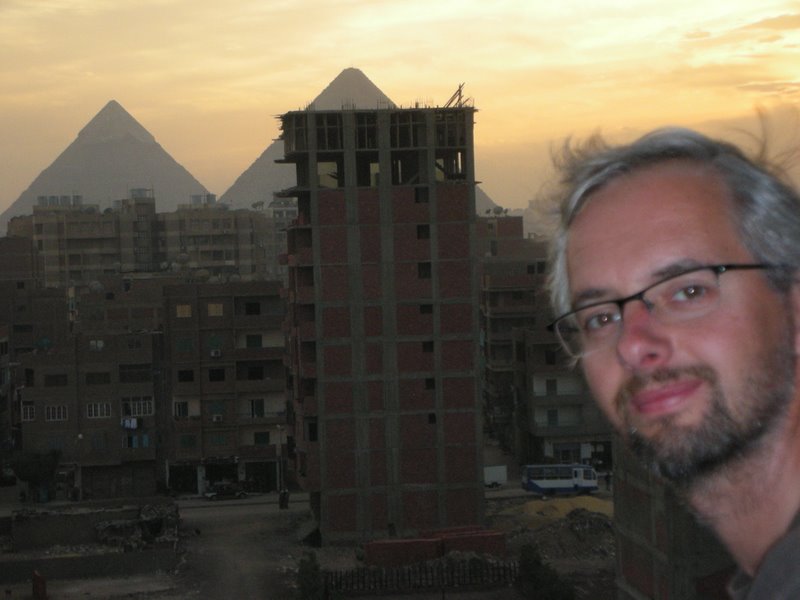 against it. Still, we got a relatively expensive
but useful (and even after opening hours) letter of recommendation from
the Swiss Embassy for this purpose.
against it. Still, we got a relatively expensive
but useful (and even after opening hours) letter of recommendation from
the Swiss Embassy for this purpose.
So far, Cairo was more of an administrative stop, with a few explanations about sites from Ibrahim, our taxi driver, who very much liked to serve as a guide. It was recommended not to drive in Cairo as parking lots are almost impossible to find and not knowing the city even to find places can be tricky. Besides, taxi fares are fairly cheap. We did not find the city as dirty and messy as we expected. Traffic is quite chaotic and blowing the horn is a much practiced habit in the streets, but as a whole it still works quite effectively.
Funny and exactly as described in the Lonely Planet guidebook, was a scene we experienced with a taxi driver, who, because we were foreigners, wanted to charge us five times the price of the trip. He stopped the car in the middle of the street (horns exploding behind), threw the money we paid to the floor and started screaming around... Luckily people we asked in the street told us he got a fair price and that these scandals are normal... It shows taxi drivers are a different species everywhere in the world...
Alexandria is a pleasant city. We were kindly offered to
stay in an apartment from a colleague of Reto, and
his family is
spoiling us with delicious food and lots of care. Yesterday we had one
of the best meals during our trip so far in a fish restaurant.
Alexandria's fame for it's great seafood is well deserved...
Meanwhile we are trying to take a brake from the trip and do a bit of homework... Here we have a washing machine running since yesterday... and finally we got time for updating the web-site. Hope to repeat this soon...
Till then!
Victoria + Reto